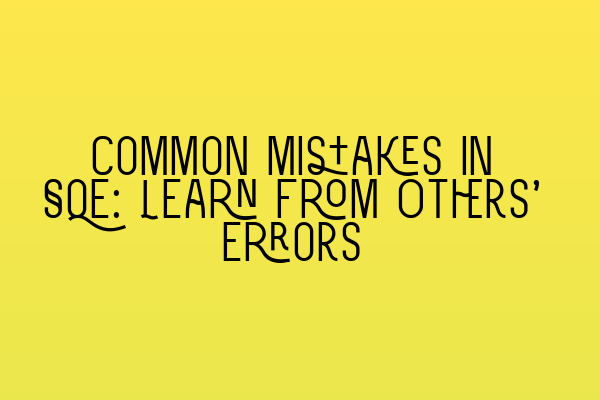Common Mistakes in SQE: Learn From Others’ Errors
Welcome to Free Mocks SQE Training, where we provide comprehensive preparation materials and resources to help aspiring solicitors excel in the Solicitors Qualifying Exam (SQE). As solicitors, we understand the importance of learning from others’ mistakes, as it allows us to avoid pitfalls and achieve success in our careers. In this blog post, we will explore common mistakes made by candidates in the SQE, so you can learn from them and enhance your chances of passing the exam.
Before we delve into the specific mistakes, it’s important to note that the SQE is a rigorous examination that tests your knowledge and skills in various areas of law. It requires thorough preparation, dedicated study, and a strategic approach. By identifying and addressing these common errors, you can optimize your study process and perform better on the exam.
1. Lack of Proper Time Management
One of the most common mistakes made by SQE candidates is poor time management. With a vast syllabus to cover, it’s crucial to allocate your study time effectively. Many candidates underestimate the time required to fully comprehend and retain the voluminous legal concepts and principles. As a result, they end up cramming at the last minute, leading to stress, confusion, and poor performance in the exam.
To avoid this mistake, create a realistic study schedule that allows for regular review and revision. Break down the syllabus into manageable chunks and allocate specific time slots for each topic. Additionally, make use of interactive SQE mock tests, such as the ones offered by Free Mocks SQE Training, to practice time management and familiarize yourself with the exam format. These mock tests can be invaluable in honing your skills and building confidence for the actual exam.
Related Article: Interactive SQE Mock Tests for Property: Sharpen Your Skills for Exam Success
2. Neglecting Practical Application
While having a strong theoretical foundation is essential, many SQE candidates make the mistake of neglecting practical application. The SQE is designed to assess not only your knowledge of the law but also your ability to apply that knowledge to real-life scenarios. Failure to grasp the practical implications of legal principles can hinder your performance and limit your chances of success.
To overcome this mistake, incorporate practical exercises into your study routine. Engage in case analysis and problem-solving to develop your analytical skills. Utilize past exam questions and sample scenarios to practice applying legal concepts to practical situations. By doing so, you will gain a deeper understanding of the law and improve your ability to handle complex legal scenarios.
3. Inadequate Familiarity with Key Topics
Another common mistake made by SQE candidates is not dedicating enough time to key topics or areas of law. The SQE covers a wide range of legal subjects, and it’s important to allocate sufficient study time to each topic. Focusing too heavily on certain areas while neglecting others can leave you ill-prepared and vulnerable to questions that you’re less familiar with.
To avoid this mistake, create a study plan that ensures adequate coverage of all the key topics. Identify your weaknesses and allocate more time to studying those areas. Familiarize yourself with the exam blueprint and prioritize topics based on their weighting. By having a balanced approach to your study, you will be better equipped to answer questions from all areas of law.
Related Articles:
SQE Prep: Essential Tips and Resources for Success in Property Practice,
An In-Depth Look at Residential Leases,
Joint Ownership: Legal Considerations for Co-Owners of Property,
Commercial Leases: Essential Insights for Business Premises
4. Insufficient Practice and Feedback
Practice makes perfect, and this holds true for the SQE as well. Many candidates make the mistake of focusing solely on theory and neglecting practice. While theoretical knowledge is vital, practical application and question-solving skills can only be honed through regular practice.
Make use of SQE mock tests, sample questions, and past papers to simulate exam conditions. Set aside specific time for practicing under timed conditions to improve your speed and accuracy. Additionally, seek feedback from experienced professionals or tutors to identify areas for improvement and fine-tune your study approach.
5. Overlooking Legal Writing and Advocacy Skills
Effective communication and persuasive writing skills are crucial for success in the SQE. However, many candidates make the mistake of overlooking the development of these essential skills. The ability to construct coherent and concise arguments and present them effectively is a key requirement of the profession.
To address this mistake, practice legal writing and advocacy throughout your preparation. Familiarize yourself with legal writing conventions, such as clear structure, proper citation, and logical arguments. Engage in mock advocacy exercises to improve your oral presentation and argumentation skills. Seek feedback from professionals to refine your style and enhance your persuasive abilities.
By avoiding these common mistakes and adopting a strategic approach to your SQE preparation, you can significantly enhance your chances of success. At Free Mocks SQE Training, we provide comprehensive resources and guidance to help you excel in the exam. Utilize our interactive mock tests and take advantage of our expert advice to maximize your potential.

Leave a Reply